As various global restrictions related to the COVID-19 pandemic continue, so do disruptions to the operations of National Statistical Offices. This comes at a time when data remain key to inform evidence-based policymaking that addresses the manifold public health, economic, and social challenges countries face.
While a crucial role has accrued to National Statistical Offices (NSOs) in supporting government action, navigating the restrictions the pandemic imposes on their operation has brought about new challenges for them. To understand these new challenges and NSOs’ needs, the Statistics Division of the United Nations Department of Economic and Social Affairs and the World Bank's Development Data Group, in coordination with the five UN regional commissions, just released the results of the third round of a global online survey to monitor the impact of the coronavirus crisis on NSOs.
The first round of the survey, released in June, highlighted the heavy impact of the crisis on NSOs that nonetheless were stepping up to new data demands. The second round, published in August, in turn, identified a crucial need for better coordination and technical assistance to avoid further exacerbation of global data inequalities.
Now, findings from the third round of the survey, completed in October with 125 countries participating, give a glimpse of the long-term impacts of the COVID-19 pandemic on NSOs’ operations.
Here are some key findings from the latest report:
- Overall, current disruptions to NSOs’ operations continue at similar levels found in in July suggesting long-lasting impacts. While the proportion of NSOs whose main offices are open to staff has marginally increased in this period, remote work continues to be the global norm. Two-thirds of NSOs still instruct at least some staff to work from home. Furthermore, little progress has been made in returning to face-to-face data collection .
- However, there are considerable differences among NSOs from countries with different income levels in their ability to return to normal operations. Large disparities are reflected, for example, in working-from-home arrangements. While in low and lower-middle income countries, 44% of NSOs that responded to the survey have not instructed their staff to work from home, this is only the case in 24% of NSOs in high income countries. Moreover, most NSOs still cannot estimate a timeframe for their return to face-to-face data collection. Almost three-quarters of NSOs in high income countries and over two-thirds of those in upper-middle income countries consider it hard to say when this will be the case. Conversely, over half of NSOs in low and lower-middle income countries expect to resume in-person interviews within the next three months.
- As disruptions due to the COVID-19 pandemic did not dissipate in the second half of 2020, many NSOs decided on long-term postponements of their planned censuses. Forty percent of NSOs with a planned population and housing census for 2020 or 2021 stated that they had to postpone data collection operations. Disruptions are particularly widespread among low and lower-middle income countries where 68% had to postpone the census, roughly half of which to after 2021. In contrast, only 24% of NSOs in high income countries that had plans to conduct a population and housing census had to postpone its original schedule.
- NSOs are developing new fieldwork protocols to collect data under COVID-conditions. Slightly more than half of surveyed NSOs have already developed new protocols such as updated guidelines for travelling, contacting respondents, conducting interviews, and practicing social distancing. Among those without new protocols, almost eight in ten NSOs would consider it useful if such protocols were developed in the future. Interest in the future elaboration of new protocols is particularly high in low and middle-income countries, highlighting a crucial area for support through the international community. Out of the countries with new protocols, 43% signaled their willingness to share them with other countries. The Intersecretariat Working Group on Household Surveys has been working on a technical note providing practical guidance for planning and implementing household surveys under COVID-19 which is going to be published on their website.
- NSOs are heavily involved in collecting data to track the spread and the impact of the COVID-19 pandemic, in many cases forming partnerships to do so. Among all NSOs interviewed, 82% are involved in collecting data on COVID-19 and its impacts. Notably, approximately 9 in 10 respondents from Sub-Saharan Africa and in Northern Africa and Western Asia (SDG region corresponding to the Middle East and North Africa – MENA) indicated their offices are planning or already implementing efforts to collect data on COVID-19 and its impacts. These efforts have been supported through partnerships with international or public sector partners and, somewhat less frequently, private sector partners. International partnerships account for the highest share in low and middle-income countries, while public sector partnerships are predominant in their high income counterparts.
As 2020 draws to a close, disruptions to NSOs continue and challenge them to step up to meet new data demands. To fulfill their critical role during the crisis, NSOs have shown adaptability by developing new protocols, forming new partnerships, and tapping into new technologies, data sources, and methods. However, there is no doubt that more technical support and collaboration is required to ensure data production continues. Particularly in low and lower-middle income countries where financial and technological resources are scarcer and access to administrative data sources is less developed, international partners play an important role. Here, a concerted effort by the international community focused on NSOs' needs will be key in order to transition to more resilient statistical systems.
An additional round of data collection is planned to take place in January 2021, and the results will be disseminated in March.
Resources:
- Read the full survey report: Monitoring the State of Statistical Operations under the COVID-19 Pandemic – Round 3
- Visit the NSO Survey webpage
- Read this blog post highlighting the results from the previous round of the survey
- Read the blog post by Haishan Fu, Director of the Development Economics Data Group and Stefan Schweinfest, Director of the UN Statistics Division, on how COVID-19 is widening the gulf of global data inequality

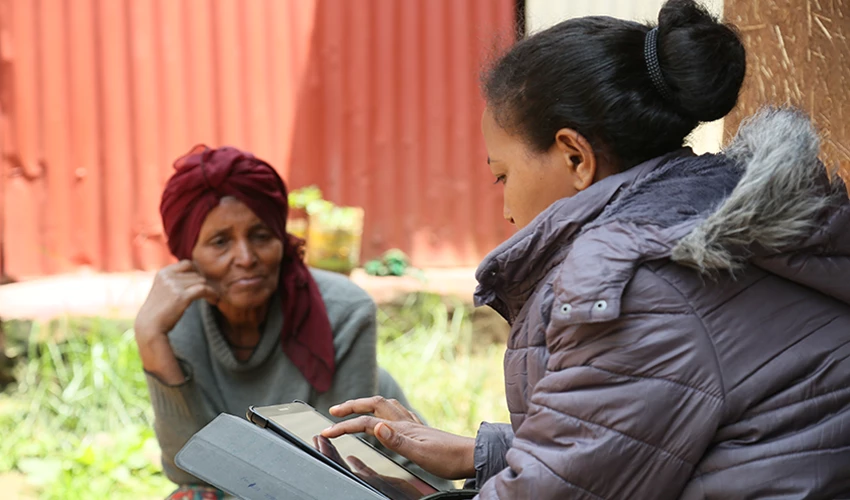
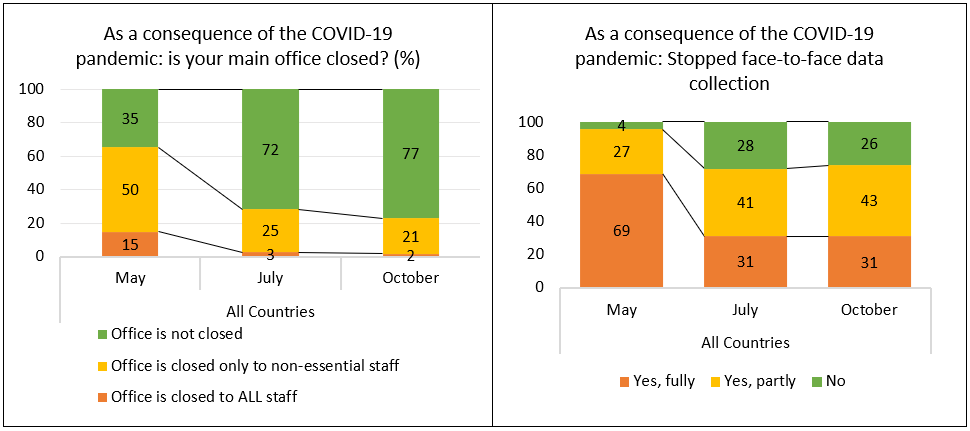
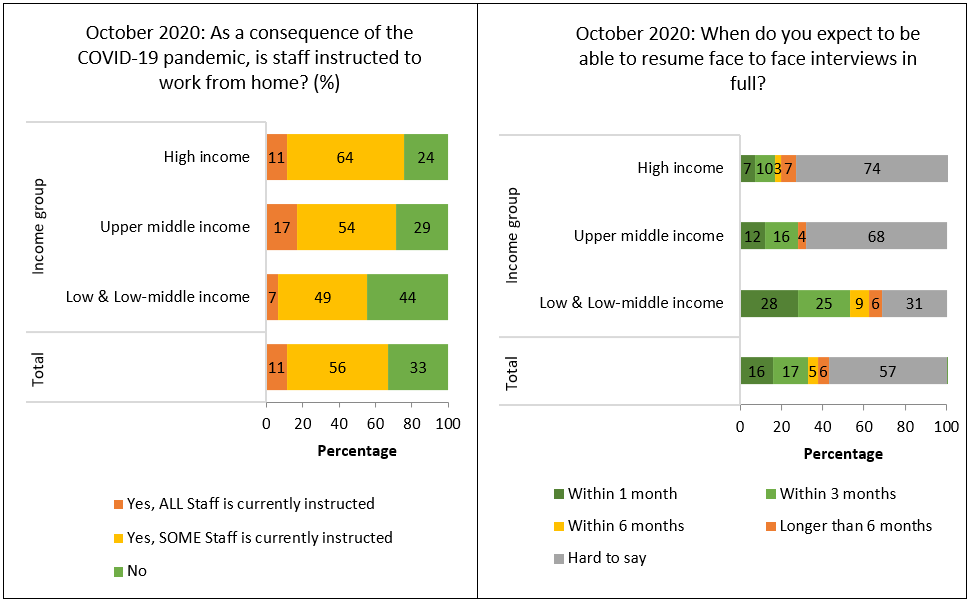
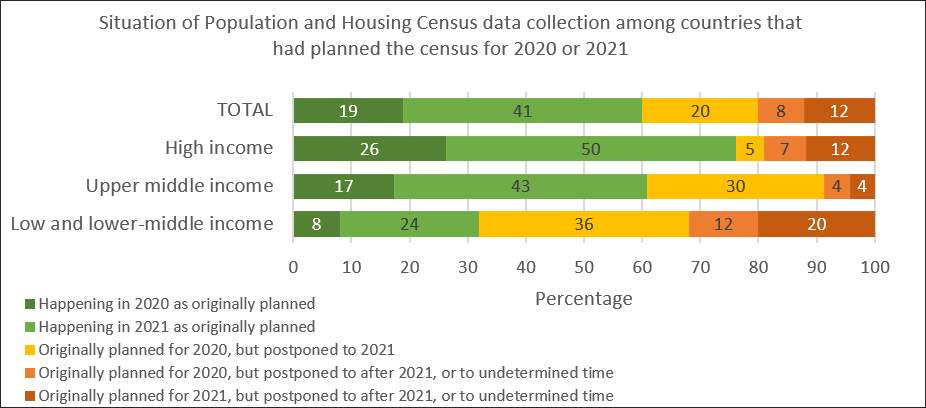
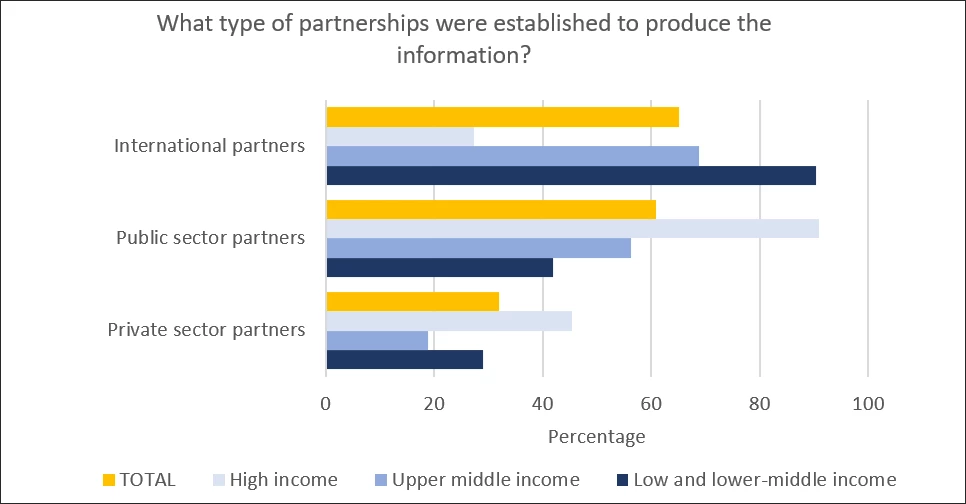





Join the Conversation